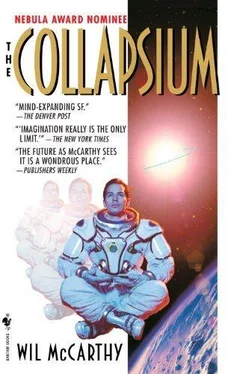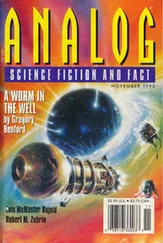Seven minutes’ travel time vanished in a faxed instant; stepping through a curtain would have provided a greater sense of travel.
The inside of the police cruiser was surprisingly large, a gravity-free cylinder twice as wide as Bruno was tall, with token “floor” and “ceiling” of waffled rubber and all the rest an expanse of wellstone, smooth gray panels set with deep, breadbox-sized niches every couple of meters, and larger, coffin-sized ones interspersed less frequently. The thing appeared to be about a hundred meters long, somewhat larger than the shattered sphere of Marlon’s house visible outside the round, di-clad portholes. The ship’s setup was enviable and no doubt expensive—a complete laboratory that could, on a moment’s notice, be reconfigured for nearly any purpose, and that could simultaneously protect or confine dozens of human beings, be they SWAT troopers or prisoners or refugees plucked from some civil disaster.
A Cheng Shiao stood, waving uncertainly, in the aisle a dozen meters ahead, next to what was probably an air-lock hatch. Tamra, with her robots on either side, advanced toward him, her improbably swiveling dernere beckoning Bruno to follow, which he did. The others appeared behind him one by one, clearly visible in the small rearview mirrors projecting forward from each of his shoulders.
“Any warning lights in your suit collar?” Shiao asked anxiously. “Any unfamiliar noises or sensations?”
“No,” Tamra answered him with apparent good cheer. Their voices rang in Bruno’s helmet as intimately as if they were right in there with him.
“Er, no,” he said, though in fact the weightlessness—despite the fax filters that had conditioned his body against space sickness—was already making him a bit queasy. The food and drink Marlon had served him earlier now seemed to be rocking back and forth as a single, fluid mass in his stomach.
“Nope,” Vivian said behind him.
“No,” Marlon said more sullenly, echoed by an even more sullen Deliah van Skeltering. Why she’d insisted on accompanying them Bruno was not at all sure—she’d seemed to regard the prospect with a mix of resentment and dread. But she’d died already; little worse could happen now. Perhaps she just wanted to feel included, to be present in case anything important happened. Or perhaps she had something material to contribute—she was, after all, a Laureate in the sciences and a Director in the bureaucracy. But that didn’t mean she enjoyed the idea. Like Bruno, she had no space-suit training of any kind, so her obvious fear of space’s vacuum was well founded, more sensible really than Bruno’s own nonchalance.
He flexed his hand, trying somehow to feel the absence of air around him. He realized, with a twinge of worry, that he’d once again neglected to leave a copy of himself behind. He wouldn’t want to ‘ t>e left behind, so the idea hadn’t occurred until now, to make a copy and mistreat it that way. Was this unwise, given the risks he was taking? Ah well, done was done, and the fax machines at both ends should retain his pattern in their buffers, at least until something else overwrote it.
He followed Her Majesty around the corner and into the airlock, both of whose doors stood open. Beyond it was some crude hardware—a kind of metal tunnel that seemed to have been jammed straight through the hull of Marlon’s home. Bruno’s sense of up and down did a little cartwheel, making him queasier still. Where the floor of the police cruiser had been “beneath” him and the airlock “in front,” now the airlock and its hatchway seemed to point “up” through the floor of Sykes Manor. And Bruno was clinging to the wall by the grapples on his boot soles! If the police hadn’t stopped the house’s spin “gravity,” he’d be falling backward right now, pivoting on broken ankles—his boot soles still clinging—until he finally bashed the back of his helmet against the wall below. But if not for the weightlessness, he wouldn’t be so disoriented in the first place. He’d be climbing a ladder or something.
The police had stopped Marlon’s house from spinning, he realized, for safety reasons. With centrifugal “gravity” pressing everything to the hull—or out through the holes the energy beam had punched in it—there would be a risk of flung debris or even outright disintegration of the house, like a merry-go-round whose bolts had all come undone.
“You’ve despun it,” Bruno said to one of the Shiaos, and though the Shiao was “below” or “behind” him and had no direct cue that he was the one being spoken to, the reply was immediate. “Yes, sir. To facilitate docking. Watch your step, please.”
This exchange of words had a soothing effect on Bruno, who hadn’t realized he was in need of soothing, hadn’t realized quite how difficult and uncomfortable and not-a-game this business was going to be. He wondered if it mightn’t be easier to disengage the boot grapples and simply launch himself up the tube, to rise like a soda bubble through the hole in Marlon’s floor. But probably, if that were easiest, they’d have told him to do it. There was of course the problem of stopping.
Her Majesty’s first robot walked up the side of the tube and around its upper lip as if this were the most natural thing in the worlds, and then Tamra herself did likewise, and then the other robot. Bruno, when his turn came, found the maneuver less difficult than it looked. Really, it was a matter of ankles and calf muscles, of letting the boots pull flat against whatever surface was handy, and of keeping ones leg—and with it the rest of the body—aligned. He marveled again at how supple these suits were. Thick enough to feel sturdy and safe as two winter coats with a suit of armor in between, they nonetheless flexed and twisted quite readily, as if shrinking away from the areas under compression—such as the insides of joints—and in turn rushing to the areas under tension, somehow adding length there, so that the fabric needn’t stretch or tighten.
Marlon’s house, alas, was a mess inside. Power had failed, leaving the interior dark save for starlight streaming in through one gaping hole, and sunlight tinting the edges of the other, and between them the wandering flashlight and headlight beams of white-space-suited evidence technicians, a dozen of whom swarmed the wreckage like bizarre creatures of the deepest ocean. Where a few hours ago there’d been marvels here, or at least architectural curiosities, now there were simply floating debris and the stubs of pillars and the empty foundations of buildings.
It looks more like Athens than ever , he thought suddenly. He nearly said it out loud, to God knew what effect on Marlon, but keeping the observation inside made it seem all the more insistently true. The real Athens, the contemporary one, preserved its temples and Acropolis forever in their twenty-first century state of ruin, lighting them up at night with floodlights and search beams…
Well, in an earlier age, at least. Bruno hadn’t been to Athens in more than eighty years, almost before the Queendom’s founding, and hadn’t heard even the slightest news of it since moving up to his little planet in the Kuiper Belt. By now, he supposed the city could look like anything: a dome or a beehive or a forest of sky-scraping towers, perhaps even a restoration of its dusty classical grandeur. There was no limit to what people could do these days, or at any rate there shouldn’t be.
“Wow,” Vivian said as she clambered up beside Bruno. “Look at this place. What a terrible shame.”
“You should have seen it before,” Marlon, who was right behind her, said. The words came slowly, and the bitterness fell away from his voice in midsentence, leaving only surprise and regret and, it seemed, finally some giddy realization that he was lucky to be alive.
Читать дальше












